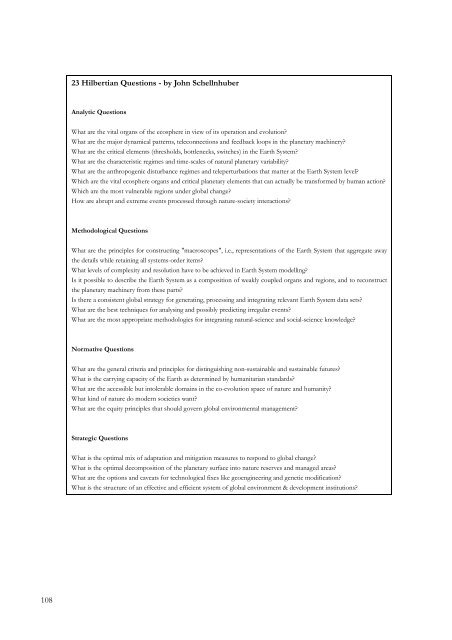PIK Biennial Report 2000-2001 - Potsdam Institute for Climate ...
PIK Biennial Report 2000-2001 - Potsdam Institute for Climate ...
PIK Biennial Report 2000-2001 - Potsdam Institute for Climate ...
You also want an ePaper? Increase the reach of your titles
YUMPU automatically turns print PDFs into web optimized ePapers that Google loves.
108<br />
23 Hilbertian Questions - by John Schellnhuber<br />
Analytic Questions<br />
What are the vital organs of the ecosphere in view of its operation and evolution?<br />
What are the major dynamical patterns, teleconnections and feedback loops in the planetary machinery?<br />
What are the critical elements (thresholds, bottlenecks, switches) in the Earth System?<br />
What are the characteristic regimes and time-scales of natural planetary variability?<br />
What are the anthropogenic disturbance regimes and teleperturbations that matter at the Earth System level?<br />
Which are the vital ecosphere organs and critical planetary elements that can actually be trans<strong>for</strong>med by human action?<br />
Which are the most vulnerable regions under global change?<br />
How are abrupt and extreme events processed through nature-society interactions?<br />
Methodological Questions<br />
What are the principles <strong>for</strong> constructing "macroscopes", i.e., representations of the Earth System that aggregate away<br />
the details while retaining all systems-order items?<br />
What levels of complexity and resolution have to be achieved in Earth System modelling?<br />
Is it possible to describe the Earth System as a composition of weakly coupled organs and regions, and to reconstruct<br />
the planetary machinery from these parts?<br />
Is there a consistent global strategy <strong>for</strong> generating, processing and integrating relevant Earth System data sets?<br />
What are the best techniques <strong>for</strong> analysing and possibly predicting irregular events?<br />
What are the most appropriate methodologies <strong>for</strong> integrating natural-science and social-science knowledge?<br />
Normative Questions<br />
What are the general criteria and principles <strong>for</strong> distinguishing non-sustainable and sustainable futures?<br />
What is the carrying capacity of the Earth as determined by humanitarian standards?<br />
What are the accessible but intolerable domains in the co-evolution space of nature and humanity?<br />
What kind of nature do modern societies want?<br />
What are the equity principles that should govern global environmental management?<br />
Strategic Questions<br />
What is the optimal mix of adaptation and mitigation measures to respond to global change?<br />
What is the optimal decomposition of the planetary surface into nature reserves and managed areas?<br />
What are the options and caveats <strong>for</strong> technological fixes like geoengineering and genetic modification?<br />
What is the structure of an effective and efficient system of global environment & development institutions?

















